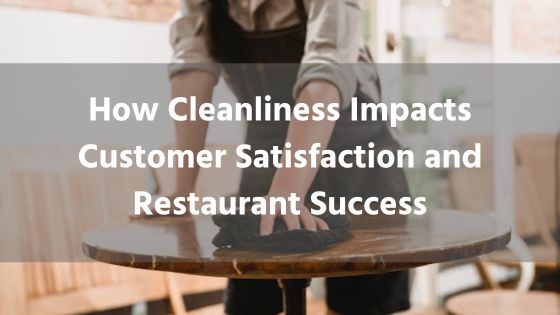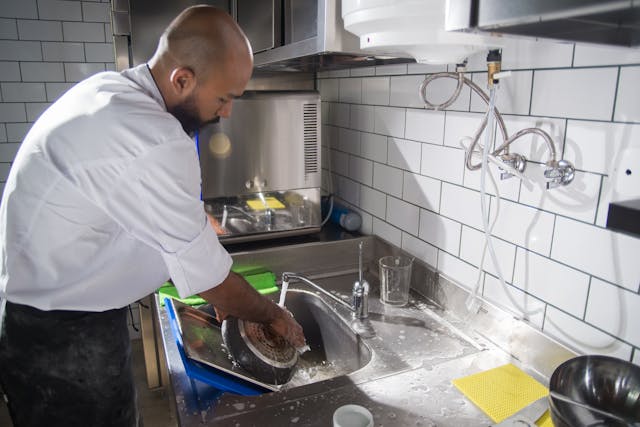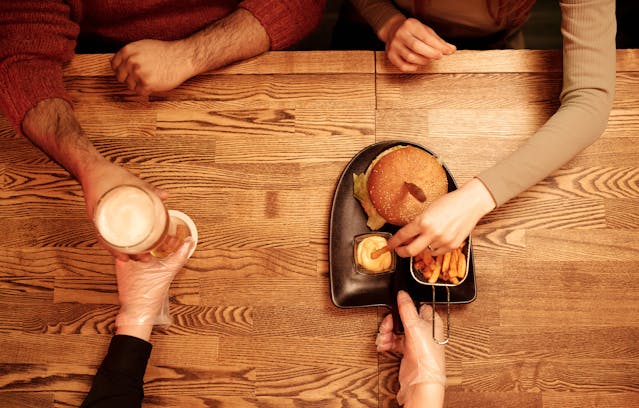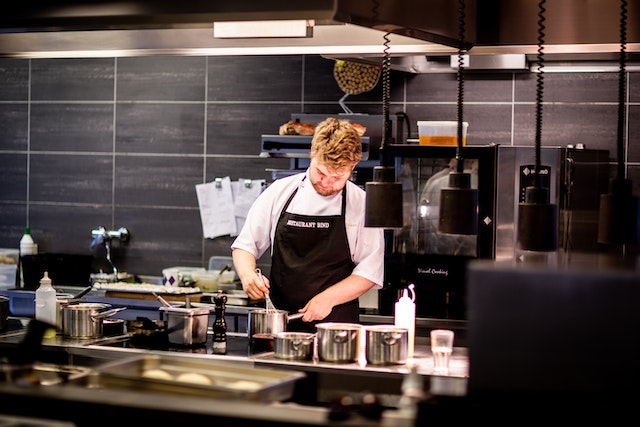Key Takeaways
- Cleanliness shapes customer perception and trust from the moment they enter your restaurant.
- Maintaining a sanitary space reduces health risks, protects your brand, and improves staff morale.
- Professional cleaning services, like those we provide at Greasecycle, help ensure deep sanitation and regulatory compliance.

When customers walk into a restaurant, their experience begins long before the first bite. The ambiance, the staff’s demeanor, and, most importantly, the cleanliness of the space all influence how diners perceive your establishment.
Let Greasecycle help you understand what takes a kitchen from clean to spotless!
In fact, a restaurant’s hygiene is one of the most powerful, immediate signals of quality and professionalism. For restaurant owners, cleanliness is not just about looking good. It is about building trust, protecting your brand, and ultimately ensuring long-term success.
FIND OUT MORE ABOUT COMMERCIAL WASTE DISPOSAL
(919) 817-6792 Commercial Waste Disposal & Processing
Cleanliness: The First Impression That Lasts
The moment a customer enters your restaurant, they form an impression within seconds. Spotless floors, gleaming windows, well-maintained restrooms, and tidy tables communicate that your restaurant is professional, food-safe, and customer-focused.
On the other hand, stained menus, greasy counters, or overflowing trash bins send a strong warning to diners, even if your food is excellent.
Customers associate cleanliness with hygiene, and hygiene with food safety. If a space looks dirty, they begin to doubt whether the kitchen is sanitary or if the staff follows proper food-handling practices. Even if there are no health code violations, the perception of uncleanliness is enough to turn guests away, possibly forever.

Customer reviews travel fast and wide. One photo of a messy restroom or an unclean table can quickly damage your reputation. Cleanliness is your restaurant’s unspoken promise that everything behind the scenes is just as well-kept as what is visible to the eye.
Customer Comfort and Satisfaction
Customer satisfaction does not depend solely on food quality. Many diners are just as concerned about whether their dining environment is pleasant, hygienic, and stress-free. Cleanliness provides comfort, allowing guests to focus on enjoying their meal rather than worrying about sticky seats or suspicious odors.
Restrooms are a crucial element in this equation. They are often viewed as a reflection of the kitchen. If guests find unclean, poorly stocked, or smelly restrooms, they will assume similar standards apply where the food is prepared.
For families with children, people with disabilities, or older guests, the cleanliness of your facilities can be a deciding factor in whether they choose to return.
By prioritizing cleanliness, you demonstrate that you value your customers’ health, comfort, and time. These are essential elements of a satisfying dining experience.
Health, Safety, and Legal Responsibility
Maintaining cleanliness in a restaurant is not just a best practice. It is a legal obligation. Health departments across the globe have strict regulations regarding food safety, cleanliness, and sanitation. Failing to meet these standards can result in warnings, fines, or even closure.
More importantly, a lack of cleanliness can lead to foodborne illnesses, putting customers at risk and exposing your restaurant to lawsuits. Cross-contamination, improper food storage, dirty equipment, or unsanitary surfaces can all contribute to serious health hazards.

A single incident can cause irreversible harm to your brand and customer loyalty.
Investing in routine deep cleaning, consistent sanitation protocols, and staff training not only keeps your operations compliant but also helps prevent costly and reputation-damaging issues down the line. You can never have too much preventative maintenance in a commercial kitchen!
LEARN MORE ABOUT OUR TRUSTED TEAM
Staff Morale and Productivity
Cleanliness not only affects your customers, it also impacts your staff. A well-kept work environment fosters pride, professionalism, and productivity. When team members work in a tidy, organized kitchen or front-of-house area, they move more efficiently, make fewer mistakes, and take their roles more seriously.
On the other hand, a disorganized and dirty workspace can lower morale and increase staff turnover. Employees may feel frustrated, unsafe, or disrespected, especially if cleanliness is not enforced equally among the team.
Structured cleaning schedules and assigned responsibilities empower staff to take ownership of their workspace. This not only keeps the restaurant cleaner but also promotes a culture of accountability, collaboration, and care.
Repeat Business and Customer Loyalty
Cleanliness has a direct influence on customer retention. Diners are far more likely to return to a restaurant where they feel comfortable, respected, and safe. If their experience is tarnished by grime, clutter, or questionable hygiene practices, they will not only avoid returning but are likely to discourage others from visiting.

Returning customers are the foundation of a successful restaurant. They cost less to acquire, tend to spend more, and are more likely to forgive occasional service hiccups if they consistently feel the environment is clean and cared for. Cleanliness builds the type of trust that supports long-term relationships with your clientele.
In an age where online reviews play a major role in dining decisions, maintaining cleanliness ensures your restaurant earns positive mentions for ambiance, comfort, and overall experience. You can also show your customers you’re health-conscious by participating in programs that turn grease into biofuel.
Cleanliness As a Marketing Advantage
While food and service are obvious marketing points, few restaurant owners realize that cleanliness can also be a strategic advantage. Highlighting your commitment to hygiene and sanitation, especially post-pandemic, can reassure guests and encourage them to choose your establishment over competitors.
Simple details such as visibly wiping tables between customers, maintaining clean uniforms, or posting sanitation protocols can go a long way in building confidence. Cleanliness also enhances your restaurant’s visual appeal, making photos more shareable on social media and your space more attractive to passersby.
Customers often rave about more than just food. They talk about how a place made them feel. A clean environment contributes to positive emotions, a sense of calm, and an elevated dining experience. These are the experiences that turn casual diners into loyal patrons.
Maintaining Standards: Tips for Restaurant Owners
Ensuring cleanliness is a daily commitment, not a one-time fix. Start by creating a comprehensive cleaning checklist that includes front-of-house, back-of-house, restrooms, and outdoor areas. Schedule routine deep cleaning sessions and designate specific responsibilities to staff to avoid confusion.
Train all team members on proper hygiene practices, including handwashing, surface sanitation, and the safe handling of food and equipment. Equip your team with high-quality cleaning products and tools, and regularly inspect their usage and effectiveness. Also make sure your kitchen’s layout keeps cleaning in mind.

Invest in regular pest control services and make sure garbage disposal protocols are consistently followed. The small tasks such as keeping menus wiped down or sweeping entryways often have the biggest visual impact.
Most importantly, lead by example. When management prioritizes cleanliness, staff are far more likely to follow suit. Cleanliness must become part of your brand culture.
Why Professional Cleaning Services Matter
While daily cleaning by your in-house team is essential, working with professional cleaners provides an added layer of assurance. Professionals have the tools, knowledge, and experience to tackle areas that are often overlooked such as vents, deep grout, grease traps, and behind appliances.
At Greasecycle, we help restaurants maintain health code standards and create a consistently spotless environment through routine services. This frees up your staff to focus on their core responsibilities, improving overall efficiency.
For high-traffic restaurants, periodic deep cleaning is essential. It removes buildup that can compromise both safety and aesthetics. By partnering with experts like us, you protect your business, preserve your brand image, and reassure guests that you go above and beyond to maintain quality.
LEARN MORE ABOUT OUR TRUSTED TEAM
Bottom Line
In the restaurant industry, success depends on more than just serving good food. It is about creating a total experience that starts the moment guests walk in and lingers long after they leave. Cleanliness is a critical part of that equation.
A clean restaurant is a thriving restaurant. It earns trust, invites loyalty, and protects your business from avoidable risks. By treating cleanliness not as an obligation but as an essential pillar of your brand, you lay the foundation for long-term success, glowing reviews, and full tables day after day.
Let our team at Greasecycle help you keep your kitchen spotless!




